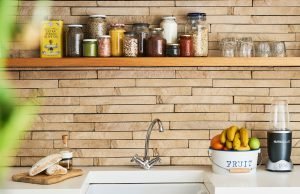
In This Post
- What is the cycle of consumerism, and why does it matter?
- How can minimalism help break the cycle of consumerism?
- 5 easy steps to overcoming consumerism in your life
In today’s consumer-driven society, it’s easy to get caught up in the cycle of buying and accumulating more and more stuff. The ‘more is more’ mindset is taught to us in almost every area of capitalist society, so to overcome consumerism is a great challenge. If it’s not material objects, other areas of life become commodified. Have you ever thought about how something as deep, complex and meaningful as love has been quantified into a simple ‘yes’ or ‘no’ option? Yeah, I’m talking about you dating app users! The commodification of things in life is so expansive, it’s hard to find something in life that hasn’t become a product.
We have become very used to things having one purpose or one lifespan. We are not in touch with the cyclical rhythm of life anymore. The thought of repairing a hole in your socks, rather than just buying a new pair was normal for such a long time. Do you know anyone who does this now?
The term ‘throw-away society’ is a good phrase to use to describe our current world. Now, you might think that the problems with this are only environmental, and the reason for us to live a more minimal lifestyle is so we can avoid the upcoming economic disaster. But the reasons to live minimally go much deeper than that.

Why Is Minimalism the Solution?
Disconnecting from the fast-paced, ultra-consumption-based lifestyle that we are taught to live in is good for you mentally, emotionally and physically. The benefits of slowing down, looking after your possessions, and removing clutter help bring you back down to earth. It can help you connect more with the natural world around you. This allows you to develop a greater sense of appreciation and understanding of your existence. It sounds very philosophical and a lot bigger than just having fewer clothes in your wardrobe. But, that’s because it is. Minimalism is as much a way to reduce clutter as it is a mental philosophy and lifestyle.
The constant pursuit of material possessions can leave us feeling overwhelmed and unfulfilled. There is a lot to be said for the negative effects of this on us personally, as well as the destructive changes to our physical environment. Minimalism offers an alternative approach to this. By focusing on living with less and prioritising experiences and relationships over material possessions, we can ground ourselves in a very chaotic world.

How Do I Overcome Consumerism?
1. Reflect on Your Values
What is most important to you in life? By identifying your values, you can align your choices and possessions with what matters most to you. There are a few ways to learn more about what values are important to you. You might automatically have a few that pop up in your head: maybe it’s love, growth, family or new experiences. You can google lists of common values and work your way down from a list of 20 to 10 to 5. The fewer you have the better – so you can prioritise things, not so you can completely detach from other values!
It’s also a good idea to consider why you value certain things. Think about who taught you that it was something worth valuing. Maybe you thought a value was important, but after a second thought, you realise that it doesn’t serve you as much purpose. Particularly for valuing things like ‘success’, really consider what success even is, and why you think it’s important. Don’t shy away from removing things that your ego wants you to hold on to. Do you really want to be a millionaire, own 10 cars or live in a mansion?
You’ve probably had several years (decades) of living in a capitalist society that teaches you to value materialistic things. Unpacking these to find your true values might take some time. Don’t give up though! Aligning and figuring out your true values is an important step in your self development journey. Figuring out what means the most to you can be an incredibly crucial factor in how you decide to live your life. Your values are also likely to change over time, so keep coming back to them and reflecting on what matters.
2. Challenge the Belief That More Is Better
It’s easy to fall into the trap of believing that more possessions will lead to more happiness. If it’s not additional possessions, it might be the constant list of upgrades or newer versions that are going to improve your life and make you a happier, more efficient, more successful person.
Unfortunately, a lot of the time, the benefits of such upgrades or purchases only last around 2 weeks. Hello hedonic treadmill! Research has shown that accumulating more stuff does not lead to increased well-being beyond a certain point. Some new purchases or upgrades in life do genuinely bring value, and you can probably reflect on your own decisions that have led you to feel proud and satisfied with a purchase. But, you can probably also think of countless decisions made to upgrade or buy something that hasn’t led to the outcome you expected.
The key here is to not beat yourself up for times when living in a consumerist way didn’t serve you. You were probably just trying your best with what you knew at the time. The most important thing here (with most things too) is to learn from the experience. Reflect on why it wasn’t the experience you were hoping it was going to be and try to understand it so you don’t make the same mistake again.
3. Practise Gratitude
Focusing on what we already have, rather than what we lack, can help to shift our perspective and reduce the desire for more stuff. Practising gratitude seems to be the answer to everything, but that’s because it really is helpful! If you’re not already reflecting (ideally daily) on the things that bring you joy, happiness, love and health then what are you doing? Whatever your values are in life, consider the ways they’re already being fulfilled.
Practising gratitude has been widely studied to have significant impacts on our mental well-being, and it can also help you ease into the minimalist mindset. By appreciating the things you already have, you drown out the consumerist urges that want to acquire more. We all have our struggles and challenges, but most of us are incredibly privileged beyond our ancestors’ wildest dreams. Seriously, imagine your 1000 BC ancestor discovering TikTok, Amazon or even just central heating. There is so much to be grateful for in life, and taking the time to remember that life isn’t so bad after all can have profound benefits for you mentally, physically, financially and emotionally.
4. Seek Out Experiences
Instead of buying material possessions, consider investing in experiences such as travel, hobbies, or learning new skills. These types of things can sometimes be commodified too, so avoid thinking of making a bucket list in a checklist type of fashion. The important thing is to truly experience the experience, rather than rush through it to say you’ve done it.
Learning a new skill or getting a new hobby can become a consumerist thing in its own way too. So maybe avoid choosing a hobby based on collecting (but if it brings you joy then go ahead!). Hobbies like sewing, repairing old technology, renovating and DIY-ing are great non-consumerist things to try.
Your hobbies also don’t have to be based on utility, or even something that you can monetise. Some of the worst advice is to commodify, capitalise on, or monetise your hobby. Not everything should be related to profit-making and consumption. I’m sure you spend enough time earning money at your day job, you don’t have to start selling things you make (unless it brings you joy, duh, then of course go ahead).

5. Focus On Making Change Happen
It’s very easy to let life become mundane because there are a lot of external stressors that take away our energy. If at the end of a long workday, you’re too tired to do anything fun for yourself other than watch TV, we’ve all been there. But, you do only get one life. Finding ways to enjoy it meaningfully and in ways that don’t destroy the planet around you is a worthy pursuit.
Practising minimalism as a mental philosophy and as a physical process has numerous benefits. These span across your whole emotional, mental, financial and physical space, as well as to your wider environment and community. You can start following this whenever you’re ready – but now is probably as good a time as any. The benefits of minimalism will be waiting for you either way!
To Put it Minimally
- Breaking the cycle of consumerism is necessary not only for your mental wellbeing, but for the health of our planet
- Minimalism offers us a useful framework to challenge the consumerist beliefs we are taught in society, and can act as a solution to the the problem of consumerism
- Some techniques you can use to help you do this include: reflecting on your values, challenging the belief that more is better, practise gratitude, seek out experiences, and focus on actually making real changes in your life




